Text
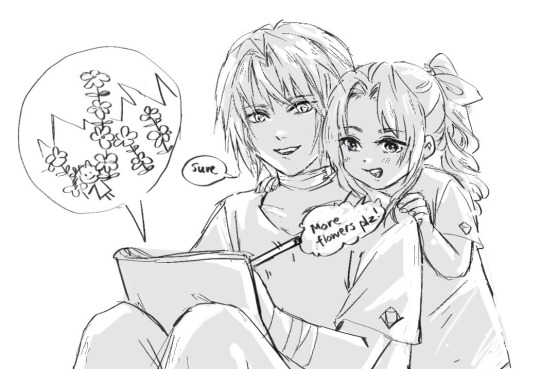
He had never seen how flowers grow so he would draw masamune-length flower stems
539 notes
·
View notes
Text

The FF7 brainrot that helps me feel like i should draw again. I know they were planned to be siblings in the early development and the proof is their hair bangs (jk but seriously?). But they ended up NOT. I think they should be and it won't affect the plot at all.
#yessssu#sephiroth#aerith gainsborough#aerith#ff7 remake#ff7 ever crisis#ffvii#ffvii remake#ffvii ever crisis#ffvii@luv fandoms
339 notes
·
View notes
Text
@amyferz Thanks a lot 👌 . The fact that it wasn't solely Hojo or the ShinRA's top brass who contributed to Sephiroth's problems looks to be vastly underexplored.
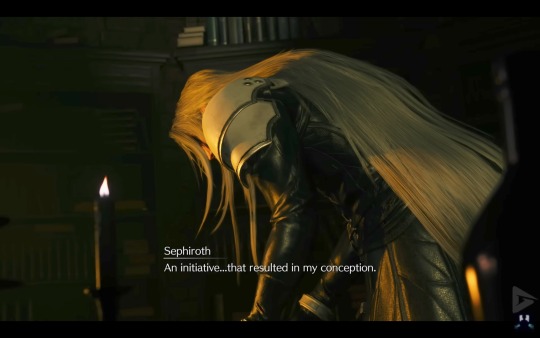
FFVII Rebirth introduces something never extensively explored in the original game or in the compilation of Final Fantasy VII: Sephiroth's anger towards Professor Gast’s experiment and the contempt he came to harbor towards ShinRA as an organization.
(Herein lurk spoilers.)
While the latter is something the fans have glimpsed on and off throughout previous installments, the second part of the Remake amplifies it ever so more. What began as admitting that the company had fabricated his legend and expressing a desire to live a normal life in Ever Crisis gradually transforms into a lack of clarity regarding his reasons for fighting in Before Crisis (as prompted by Elfe), followed by an open disgust towards Hojo's and Hollander's experiments when confronted with Mako pod entities during the hunt for Genesis. Sephiroth and Zack's ordeal during Crisis Core events appears to undercut his willingness to stay, as he famously considers leaving the corporation right before embarking on the ill-fated Nibelheim expedition.
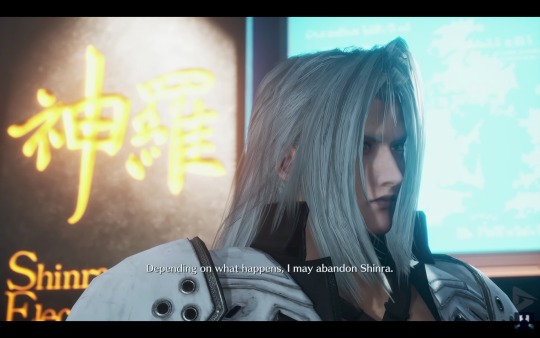
FFVIIRb picks off where we left off, painting a more complete picture of Sephiroth's dissatisfaction with ShinRA overall. Interestingly, one of the discarded sequences from the original game featured Sephiroth hinting at his lack of affection for his employer as early as the truck ride.
Narratively, the sequence spans the gap between OG and Crisis Core's departure cutscene, implying that Sephiroth used the time on the road to reflect on his current and future connection with ShinRA. His companion, however, does not appear to understand why he is bringing the topic up. What distinguishes Rebirth is the suggestion that Sephiroth came to view the entire ShinRA system as a problem, rather than just a few rotten apples. He no longer singles out Hojo, but rather the entire ShinRA branch, indicating that something's wrong with the system. When "Cloud" casually inquires about the problem with the Nibelheim reactor, Sephiroth responds that it is "people who run it," adding that this particular site is controlled by the Research and Development department. In addition, in response to "Cloud's" fair comment regrading the lack of transparency in company's operation, he rather sarcastically suggests to bring the issue with the President, thus implicitly conveying the futility of the endeavor.
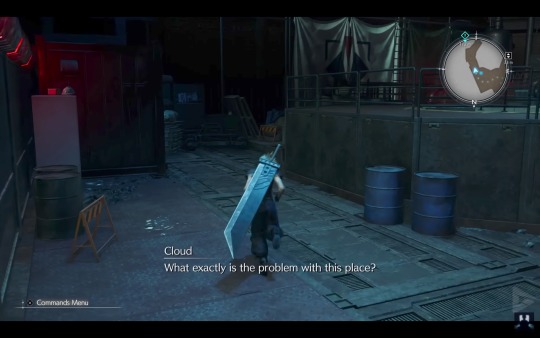
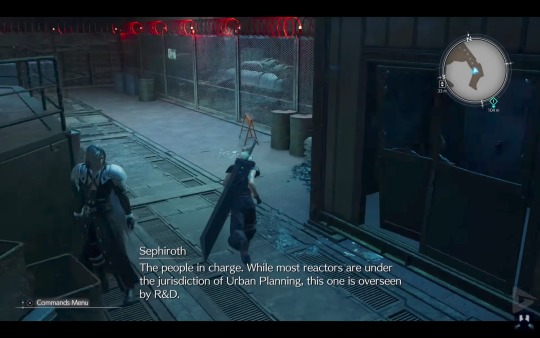
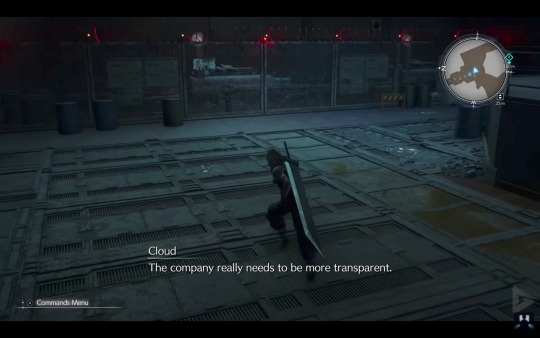
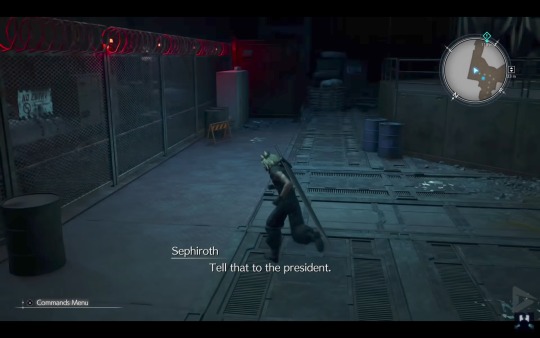
When the party encounters Mako pod residents, one can detect genuine rage in his voice. While Sephiroth had previously shown bitterness for the test subjects during CC, it was tinged with disgust/pity rather than wrath. And once again, I’m grateful to Tyler Hoechlin for broadening his range in this particular segment.
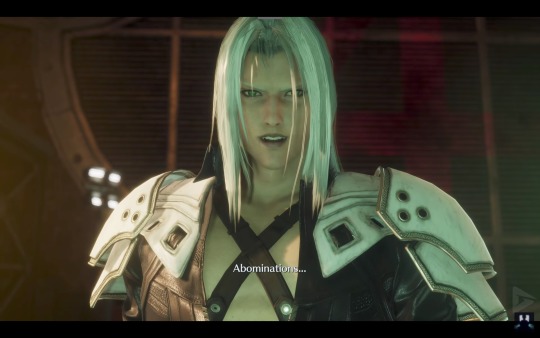
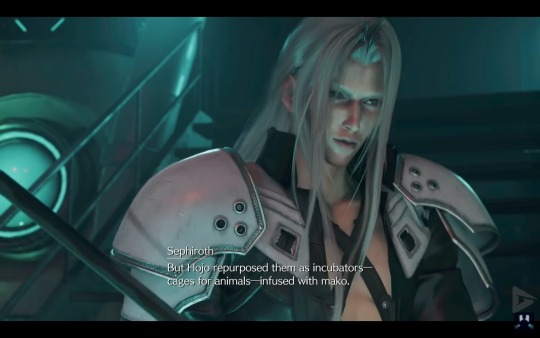
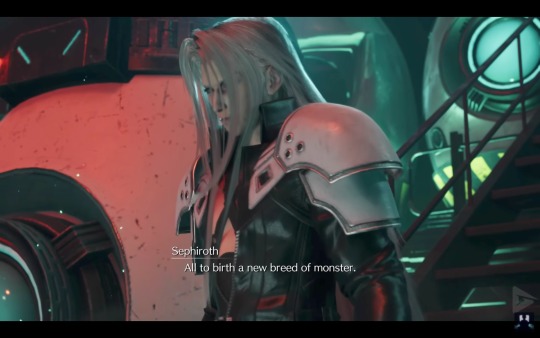
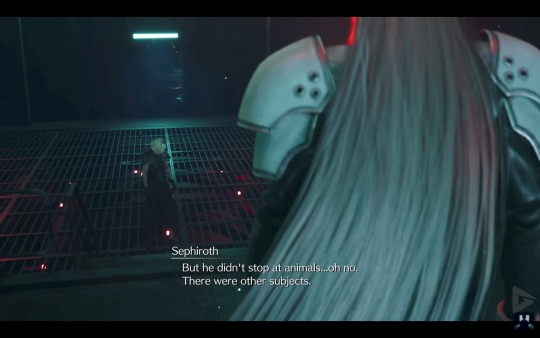
"Cloud's" reaction to the contents of the pods, however, came off a little weird. The confusion appears out of place, because Zack had seen it all before — he had been there to watch the aftermath of Hollander's work; is it really odd that ShinRA's chief R&D scientist spearheaded the entire thing? Perhaps, unlike Sephiroth, Zack treated it as a rotten-apple issue, rather than a systemic issue. Or maybe this is an example of Cloud being an unreliable narrator, having conflated his own experience with that of Zack, which also explains Zack being sort of too green for the First Class throughout the Nibelheim portion of the game.
The shift in Sephiroth's perspective, from singling out Hojo's misdeeds to viewing ShinRA's itself as a systemic problem, is further highlighted during the mansion segment. This is no longer a strictly Hollander or Hojo issue. Human experimentation formed the fundamental core of what ShinRA is now, and those were approved from the very top. As Sephiroth puts it with barely concealed disgust, as soon as the company realized what had fallen into their hands, they became ambitious.
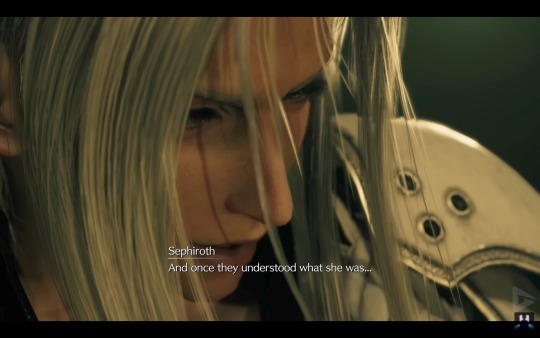
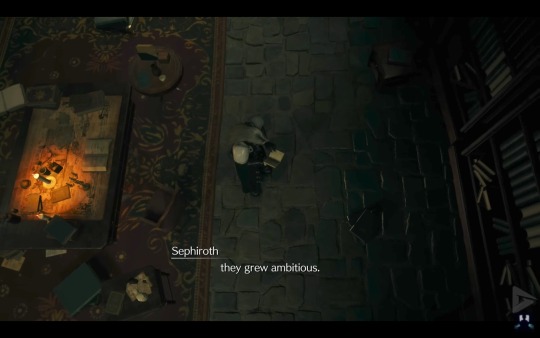
The wording also strikes a contrast to how he used to refer to the company in the past; as such, when Angeal deserts, Sephiroth states that Angeal has betrayed “US”, which points at both his personal connection to the person and the fact that Sephiroth likely saw himself as part of ShinRA circle. In the library, however, he distances himself by referring to the company as THEM, thus no longer perceiving himself as a part of it.
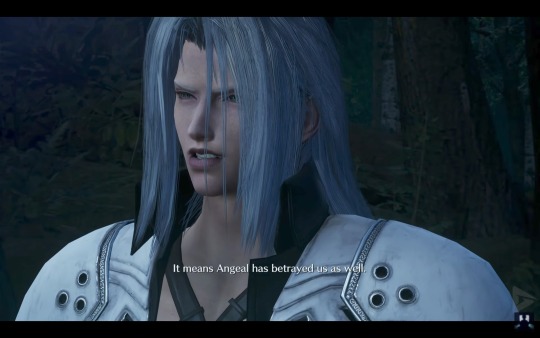
More important still is the rage he expresses when quoting excerpts from Gast's notes. The anger is new, never before seen touch. Sephiroth has been portrayed in the moment differently throughout earlier installments — dejected, perhaps overwhelmed, but never angry enough to snarl and nearly flip the table.
And it's wonderful. It's authentic, and it makes sense. It makes you question how much of that rage has been bottled up, compartmentalized, and never fully processed throughout the years. That rage should have existed, but was suppressed by ShinRA, before becoming internalized and sealed.
The scene is extremely on point on another level as well. As the flash of rage passes, and Sephiroth looks away, hiding eyes behind bangs — a gesture previously briefly appearing in Crisis Core.
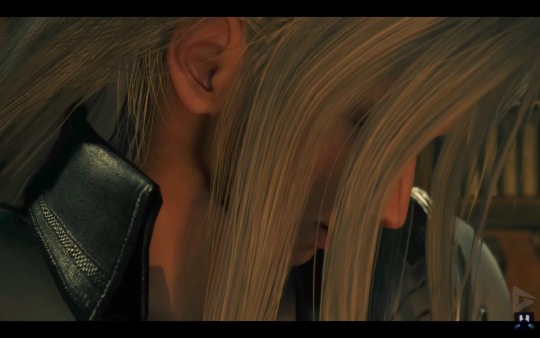
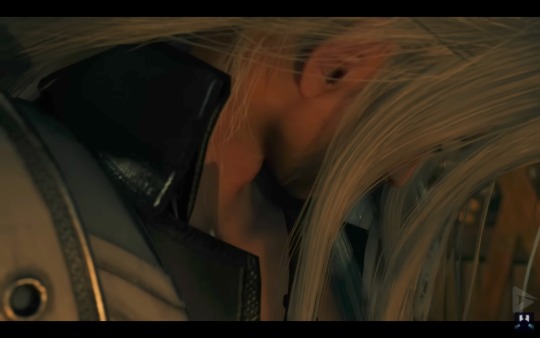
One could interpret the body language as being ashamed and unwilling to show his composure cracking. Even in this state he KNOWS he wasn't supposed to let anyone see hurt or anger, wasn't supposed to lose cool. The "wonder child" and the "poster boy" is not to be seen as something other than “efficacious” and “collected”. The habit of suppressing displays of emotion or physical/psychological ailment had apparently become a part of himself. It doesn't take a lot of imagination to deduce why the habit persists. The internalized compulsion to live up to the expectations placed on him by ShinRA and the myth it imposed on his character, as well as the internalized imperative not to reveal to someone like Hojo — anyone— the extent to which their acts or words affect him. There's also another layer to this shame — one of being an artificial creation, but that's for another write up.
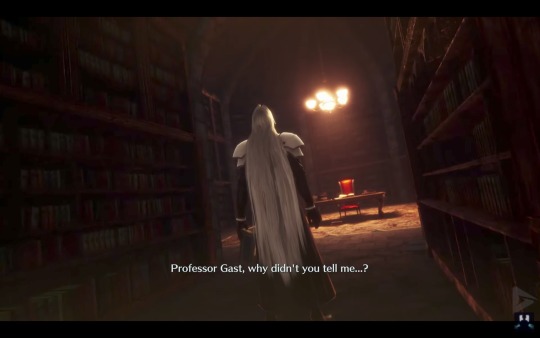
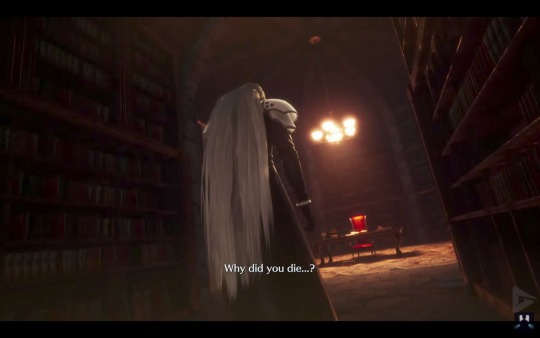
The anger towards Gast differs greatly from the way Sephiroth went “Why didn't you tell me?” in previous iterations of the Nibelheim incident. In retrospect, Gast's supervision of the project, involvement in Sephiroth's life, and unexpected departure seem like a betrayal. Gast had not only abandoned Sephiroth, who had likely come to see him as a salient figure in his youth, but had also been lying to him all along, until finally discarding him, as Sephiroth might believe. Gast therefore falls from grace, becoming yet another person who misled, attempted to exploit, and eventually abandoned him to deal with the consequences on his own.
277 notes
·
View notes
Text

FFVII Rebirth introduces something never extensively explored in the original game or in the compilation of Final Fantasy VII: Sephiroth's anger towards Professor Gast’s experiment and the contempt he came to harbor towards ShinRA as an organization.
(Herein lurk spoilers.)
While the latter is something the fans have glimpsed on and off throughout previous installments, the second part of the Remake amplifies it ever so more. What began as admitting that the company had fabricated his legend and expressing a desire to live a normal life in Ever Crisis gradually transforms into a lack of clarity regarding his reasons for fighting in Before Crisis (as prompted by Elfe), followed by an open disgust towards Hojo's and Hollander's experiments when confronted with Mako pod entities during the hunt for Genesis. Sephiroth and Zack's ordeal during Crisis Core events appears to undercut his willingness to stay, as he famously considers leaving the corporation right before embarking on the ill-fated Nibelheim expedition.

FFVIIRb picks off where we left off, painting a more complete picture of Sephiroth's dissatisfaction with ShinRA overall. Interestingly, one of the discarded sequences from the original game featured Sephiroth hinting at his lack of affection for his employer as early as the truck ride.
Narratively, the sequence spans the gap between OG and Crisis Core's departure cutscene, implying that Sephiroth used the time on the road to reflect on his current and future connection with ShinRA. His companion, however, does not appear to understand why he is bringing the topic up. What distinguishes Rebirth is the suggestion that Sephiroth came to view the entire ShinRA system as a problem, rather than just a few rotten apples. He no longer singles out Hojo, but rather the entire ShinRA branch, indicating that something's wrong with the system. When "Cloud" casually inquires about the problem with the Nibelheim reactor, Sephiroth responds that it is "people who run it," adding that this particular site is controlled by the Research and Development department. In addition, in response to "Cloud's" fair comment regrading the lack of transparency in company's operation, he rather sarcastically suggests to bring the issue with the President, thus implicitly conveying the futility of the endeavor.




When the party encounters Mako pod residents, one can detect genuine rage in his voice. While Sephiroth had previously shown bitterness for the test subjects during CC, it was tinged with disgust/pity rather than wrath. And once again, I’m grateful to Tyler Hoechlin for broadening his range in this particular segment.




"Cloud's" reaction to the contents of the pods, however, came off a little weird. The confusion appears out of place, because Zack had seen it all before — he had been there to watch the aftermath of Hollander's work; is it really odd that ShinRA's chief R&D scientist spearheaded the entire thing? Perhaps, unlike Sephiroth, Zack treated it as a rotten-apple issue, rather than a systemic issue. Or maybe this is an example of Cloud being an unreliable narrator, having conflated his own experience with that of Zack, which also explains Zack being sort of too green for the First Class throughout the Nibelheim portion of the game.
The shift in Sephiroth's perspective, from singling out Hojo's misdeeds to viewing ShinRA's itself as a systemic problem, is further highlighted during the mansion segment. This is no longer a strictly Hollander or Hojo issue. Human experimentation formed the fundamental core of what ShinRA is now, and those were approved from the very top. As Sephiroth puts it with barely concealed disgust, as soon as the company realized what had fallen into their hands, they became ambitious.


The wording also strikes a contrast to how he used to refer to the company in the past; as such, when Angeal deserts, Sephiroth states that Angeal has betrayed “US”, which points at both his personal connection to the person and the fact that Sephiroth likely saw himself as part of ShinRA circle. In the library, however, he distances himself by referring to the company as THEM, thus no longer perceiving himself as a part of it.

More important still is the rage he expresses when quoting excerpts from Gast's notes. The anger is new, never before seen touch. Sephiroth has been portrayed in the moment differently throughout earlier installments — dejected, perhaps overwhelmed, but never angry enough to snarl and nearly flip the table.
And it's wonderful. It's authentic, and it makes sense. It makes you question how much of that rage has been bottled up, compartmentalized, and never fully processed throughout the years. That rage should have existed, but was suppressed by ShinRA, before becoming internalized and sealed.
The scene is extremely on point on another level as well. As the flash of rage passes, and Sephiroth looks away, hiding eyes behind bangs — a gesture previously briefly appearing in Crisis Core.


One could interpret the body language as being ashamed and unwilling to show his composure cracking. Even in this state he KNOWS he wasn't supposed to let anyone see hurt or anger, wasn't supposed to lose cool. The "wonder child" and the "poster boy" is not to be seen as something other than “efficacious” and “collected”. The habit of suppressing displays of emotion or physical/psychological ailment had apparently become a part of himself. It doesn't take a lot of imagination to deduce why the habit persists. The internalized compulsion to live up to the expectations placed on him by ShinRA and the myth it imposed on his character, as well as the internalized imperative not to reveal to someone like Hojo — anyone— the extent to which their acts or words affect him. There's also another layer to this shame — one of being an artificial creation, but that's for another write up.


The anger towards Gast differs greatly from the way Sephiroth went “Why didn't you tell me?” in previous iterations of the Nibelheim incident. In retrospect, Gast's supervision of the project, involvement in Sephiroth's life, and unexpected departure seem like a betrayal. Gast had not only abandoned Sephiroth, who had likely come to see him as a salient figure in his youth, but had also been lying to him all along, until finally discarding him, as Sephiroth might believe. Gast therefore falls from grace, becoming yet another person who misled, attempted to exploit, and eventually abandoned him to deal with the consequences on his own.
#sephiroth#ff7 rebirth#ffvii rebirth#final fantasy vii rebirth#ff7#ffvii#final fantasy 7#ff7 remake#ffvii remake#ff7 crisis core#final fantasy vii#ffvii@luv fandoms
277 notes
·
View notes
Text
Such an incredible write up 👏.
Thank you so much for taking your time to jot it down and share.
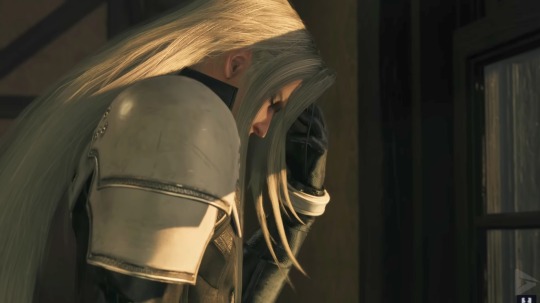
I particularly enjoy how they handled Sephiroth's arrival to Nibelheim, juxtaposing his inner state with the perception that the other characters and the public appear to have of him.
Spoilers, obviously.
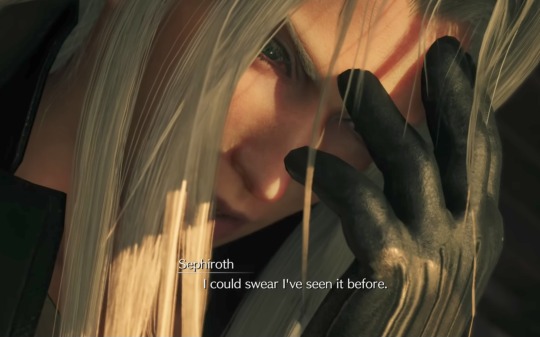
Consider this scene for example. Sephiroth is visibly disturbed by both the familiarity of his surroundings and the fact that he cannot place the dejavu it created. But when Cloud/Zack asks whether he's okay, he immediately turns the conversation to the other party's well-being and readiness.
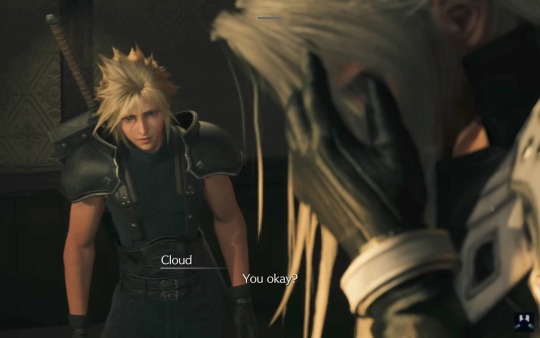

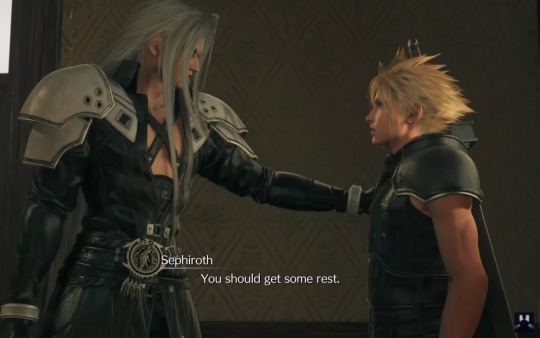
This demonstrates how much he embraced the idea that he has to endure and never show weakness or discomfort, that he *MUST* always be okay. It also shows that he's not used to being questioned if he's alright. Anyone who grew up with a narcissistic parent would recognize the internalized rule of not causing trouble for others, which includes not being physically or mentally unwell.
And a part of the general public did support that image, with some even dismissing the idea of a "living legend" being ill, claiming that a hypothetical "mako poisoning isn't going to hurt him".
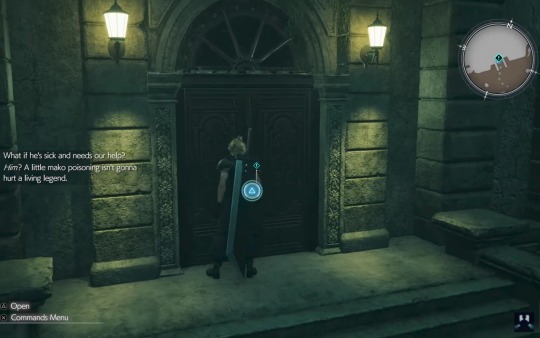
In some ways, an idea like that stripped its intended target of human nature long before Sephiroth lost his marbles in the mansion’s basement.
Cloud/Zack follow a similar line of thought. It took Cloud/Zack nearly a week to go check on his colleague. A week without sleeping, eating, or drinking. It's kind of mind-boggling, until you remember that his "Sephiroth was in a different league" also meant that in Zack's/Cloud's perspective, human norms didn't apply to him, and the idea of physical and mental deterioration due to stress, starvation or lack of sleep never ever occurred to them.
It's sad really. Sephiroth's reputation fueled by ShinRA marketing rendered him “beyond human” long before Gast’s revelations in the project records did. Even people like Zack, who worked with him on and off for years seemingly couldn't imagine that he, too, had human limits.
337 notes
·
View notes
Text
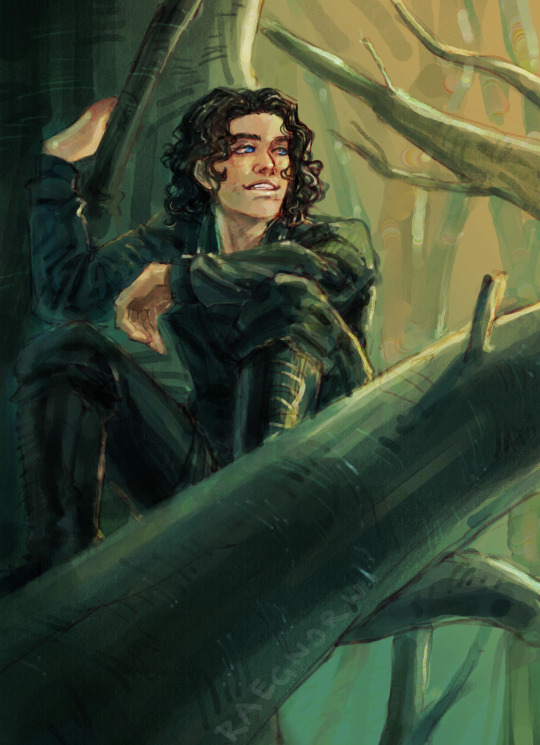
2024 bast is very different from 2022 bast
65 notes
·
View notes
Text

I particularly enjoy how they handled Sephiroth's arrival to Nibelheim, juxtaposing his inner state with the perception that the other characters and the public appear to have of him.
Spoilers, obviously.

Consider this scene for example. Sephiroth is visibly disturbed by both the familiarity of his surroundings and the fact that he cannot place the dejavu it created. But when Cloud/Zack asks whether he's okay, he immediately turns the conversation to the other party's well-being and readiness.



This demonstrates how much he embraced the idea that he has to endure and never show weakness or discomfort, that he *MUST* always be okay. It also shows that he's not used to being questioned if he's alright. Anyone who grew up with a narcissistic parent would recognize the internalized rule of not causing trouble for others, which includes not being physically or mentally unwell.
And a part of the general public did support that image, with some even dismissing the idea of a "living legend" being ill, claiming that a hypothetical "mako poisoning isn't going to hurt him".

In some ways, an idea like that stripped its intended target of human nature long before Sephiroth lost his marbles in the mansion’s basement.
Cloud/Zack follow a similar line of thought. It took Cloud/Zack nearly a week to go check on his colleague. A week without sleeping, eating, or drinking. It's kind of mind-boggling, until you remember that his "Sephiroth was in a different league" also meant that in Zack's/Cloud's perspective, human norms didn't apply to him, and the idea of physical and mental deterioration due to stress, starvation or lack of sleep never ever occurred to them.
It's sad really. Sephiroth's reputation fueled by ShinRA marketing rendered him “beyond human” long before Gast’s revelations in the project records did. Even people like Zack, who worked with him on and off for years seemingly couldn't imagine that he, too, had human limits.
#sephiroth#ff7#ffvii#ffvii rebirth#ffvii remake#nibelheim#final fantasy 7#ff7 remake#final fantasy 7 rebirth#final fantasy vii rebirth#ffvii@luv fandoms
337 notes
·
View notes
Text
A pleasure.
That scene is remarkable, isn't it? To me, it read like the last moments we saw Sephiroth as an individual, before his mind snapped under all the suffering and Jenova took over, as implied by yet another glitch-like episode. The snarling and tossing of the journal imply both rage and frustration, which Jenovaroth isn't known for displaying. Sephiroth, as most people knew him, was also not known to express it, which is not surprising given that Hojo and the entire SOLDIER training programme likely aimed to suppress any displays of negative emotions in their subject(s) — and yet the hurt and wrath were genuine. Human-like. It appears that there is a degree of shame there, as well as a subconscious desire to mask emotions: Sephiroth looks away, virtually hiding his eyes with his bangs – a shtick that is prominent in Crisis Core. I would accept part of it at face value. To some extent, he didn't want to acknowledge how much the information made him vulnerable and led him to act irrationally. After all, when one considers it, the journal is evidence of yet another betrayal by someone who was once significant to him.
However, there was a hint of resignation in his tone, as if he had run out of straws to hang onto. Perhaps it was meant to symbolize Sephiroth admitting the truth about himself – his fellow SOLDIER members turned out to be monsters (in Genesis' terminology); how long would he run from the non-zero chance that he, too, had been tampered with? Perhaps, as you suggest, he was literally giving up on his struggle with Jenova. In that case, given that you mention "illusion" instances of Sephiroth possibly being constructs of Cloud's mind, I'm curious how Jenova might have "channelled" itself to Sephiroth, provided that she's part of him on a genetic level. Was it literally her voice in his head, or did she manifest as intrusive thoughts that appeared as his own?
Overall, I'm glad we're getting additional calamity-from-the-skies background, regardless of whether it alters the circumstances of Sephiroth's fall from grace. The entity is both frightening and intriguing on its own, and it's a shame it didn't get more attention in OG.
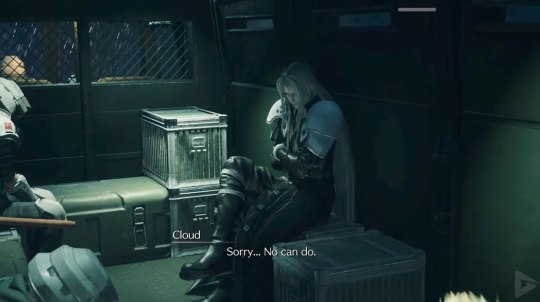
The second episode of the Remake, FF7 Rebirth, has proven to be a terrific experience thus far. SE obviously made a few big decisions here and there.
It is seemingly implied now that Jenova wasn't "brain-dead", and it is hinted that Sephiroth was addled during his breakdown.
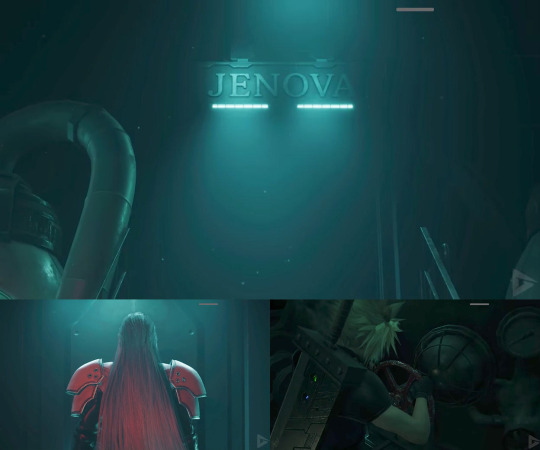
It all begins with a strategically placed cut, when Sephiroth touches the door bearing the name Jenova and instructs "Cloud" to close the valve. The scene is merely functional for new fans, yet leaves a vacant space that Crisis Core players will quickly fill in with the inferred arrival of Genesis. Smart move that, leaving the interpretation to the player. Whether Genesis exists inside the Remake's continuity or not, the moment reads differently to each fan. Quite frankly, I was half-expecting “Cloud” to come across a banora apple, rolling on the floor, but I suppose that would be telling.
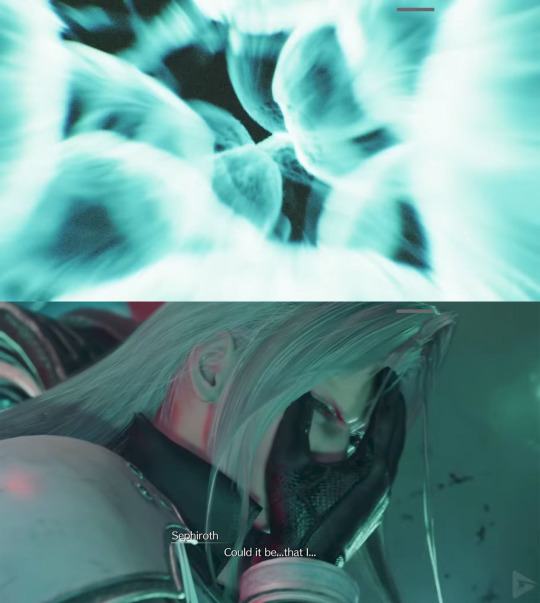
What's remarkable is that they give Sephiroth almost identical symptoms to those that Cloud has in the remake. Glitches and odd headaches superimpose themselves nicely over the original Crisis Core scene. And, as much as I loathe Tyler Hoechlin's acting in the game, he lends a tangible sense of rage to Sephiroth's disparaging remarks about Hojo and his experiments. You can hear the hatred, a touch of pity, and disgust directed at Hojo's work and the creatures he tortured. In Crisis Core, he refers to the test subjects as “abominations” with the same touch of bitterness.
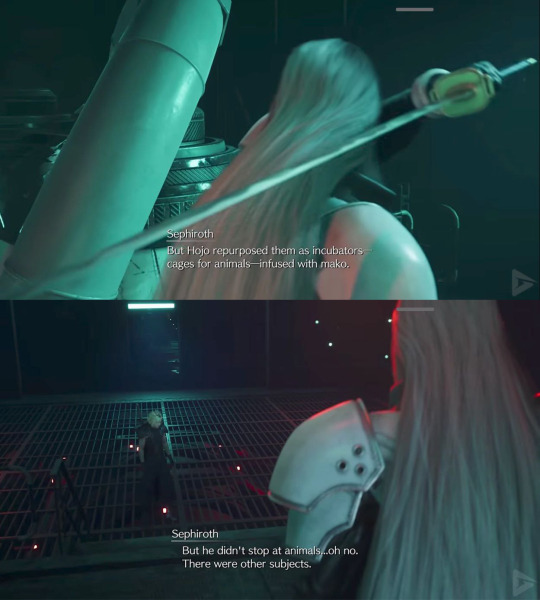
Back to the point: glitches, pupil dilations, and headaches are visual cues for Jenovaroth's influence or proximity, as shown in the first part of the Remake. However, at this point, Sephiroth is still sane — cracking, but still himself — so the only agent who can exert influence on him is, well, Jenova.
Now, a widely established fan hypothesis maintained that Jenova was brain-dead or comatose. Bodily functions sustained, but brain activity plateaued. Rebirth, however, strangely suggests otherwise.
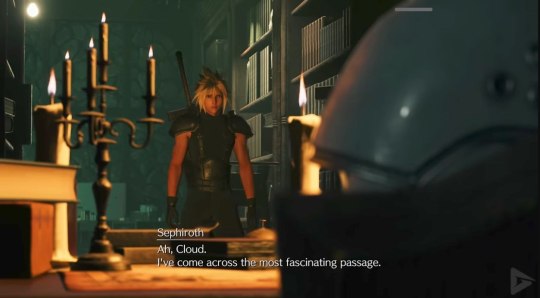
When "Cloud" returns to Sephiroth in the manor's basement for the second time, Sephiroth recites an excerpt from a journal purportedly written by Professor Gast:
“The specimen, found in a strata dating back two thousand years, smiled with what could only be described as 'ethereal grace'… Though the truth eluded me at first, I later determined that she was an Ancient - or a 'steward of the planet', as they are referred to in legend”.
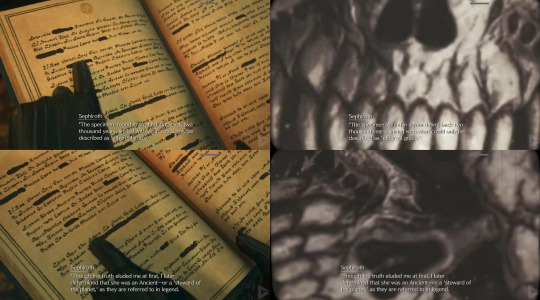
Remembering the battles with Jenova Dreamweaver and Jenova Emergent, the creature is far from "graceful" or "ethereal". There is nothing graceful about her figure in the tube either, and she is not smiling. The game goes out of its way to lampshade the glaring contradiction by showing the flashes of Jenova’s fanged skull and grotesque body as Sephiroth quotes the passage. So how could Gast perceive her as such?.. The answer is most likely found in Jenova Dreamweaver's description given in Ultimania: the entity has the ability to induce hallucinations in individuals who come into proximity with it, which is further corroborated by Jenova Emergent description.
An ancient lifeform that Shinra Company has kept under strict
confidentiality. Those who come into contact can have their
conscience interfered as well as see illusions. Professor Hojo
has dedicated half of his life to researching Jenova, and within
the Shinra Company building's top floors lies a secret research
center called the "Dome," where Jenova's cells are injected into
lifeforms or machinery to conduct experiments. (Ultimania)
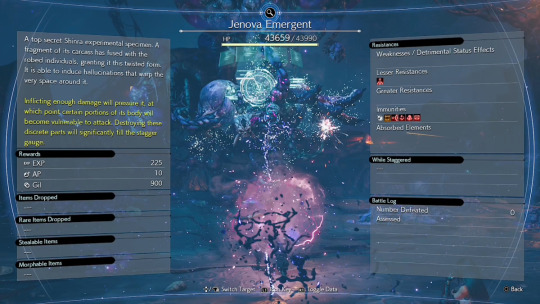
Gast even writes that “the truth eluded him at first”, but LATER he determined the specimen belonged to the race of Ancients, as that answer was suggested. The implication is chilling: Jenova may have purposefully misled Gast in order to present itself as an Ancient. As Sephiroth later explains in the FF7Rb, Jenova is capable of seeing deep into one's soul and impersonating individuals you fear, love, or hate.
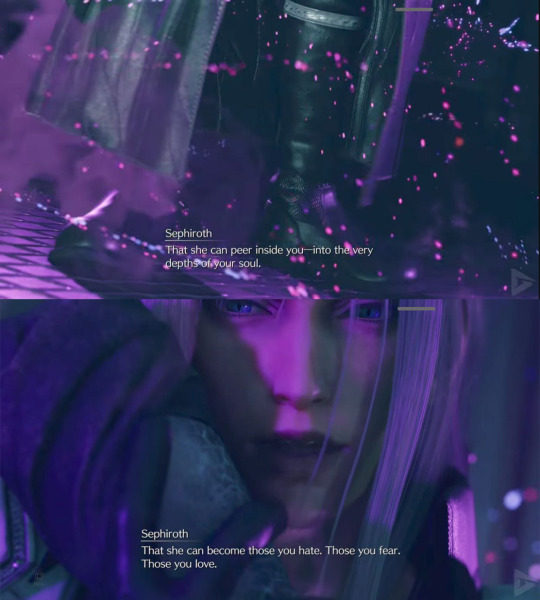
If ShinRA and Gast were determined to unravel the mysteries of Ancients and their Promised Land, it would make sense for Jenova to "scan" Gast and determine the best course of action: disguise itself as an Ancient in order to escape captivity in geological strata jail.
The scene in which Sephiroth reads Gast's notes is possibly the final time he is more or less himself, before Jenova's image intermingles with his for a brief moment. Again, I appreciate Tyler's voice acting in this particular section and the real rage he brought to it. Admittedly, I was concerned that with next-gen visuals, they would take a more gruesome approach, displaying Sephiroth conducting the Nibelheim carnage with sadistic pleasure, but they took a different route. Slow, zombie-like movements, and a glassy expression.
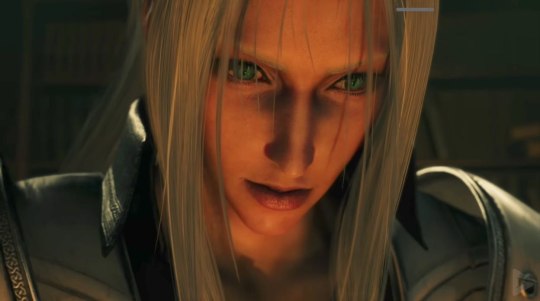
He speared the militiamen as casually as if he were spearing bugs, which is far more frightening from a narrative point. What jumped out was how they emphasized the possessed-like behavior: from snarling and flailing the book like a suffering person to an empty countenance and automaton-like strides, as if he was being beckoned. Which is what "Mother is waiting" implies.
The final segment of the Nibelheim flashback is likely the most essential as well. According to previous developer claims, Sephiroth's will took precedence over Jenova's, and he was in control — whether Jenova was brain-dead or simply of lesser willpower. However, the Rebirth appears to suggest something different right off the bat. First, "Cloud" shouts, "I believed in you… No… Not you — whoever the hell you are!", highlighting the significant personality change and the resulting lack of recognition. But then "Cloud" sees Jenova's image superimposed over that of Sephiroth in a rapid, glitch-like succession.
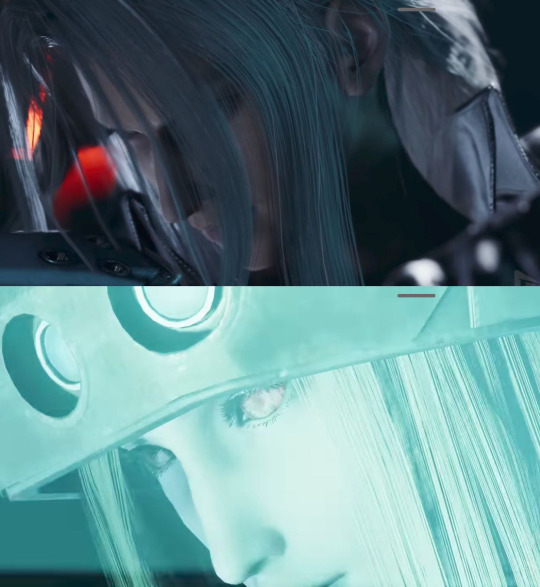
In other words, he sees Jenova inhabiting Sephiroth's body as a vehicle to once again escape the confinements. Whatever that means, whether it suggests that Jenova is in control from the start, or whether Sephiroth is literally the greatest functional agglomeration of her cells, and therefore literally “becomes” Jenova.
If Jenova's original body was severely damaged — either as a result of eons of incarceration or Hojo's tinkering — it stands to reason that, if she wished to carry out her plan, she would need a new body, one capable of moving at the very least. Perhaps Sephiroth, an able-bodied skilled Mako-infused fighter of considerable might, served as a better "vessel" than her original damaged one.
But the crux of the matter lies elsewhere. The possibility of Jenova being conscious and influencing Gast is very terrifying. With the potential to affect others in close vicinity, she may have influenced the minds of the whole science team behind the Jenova Project, particularly those who had long-term contact with her tissue — Gast and Hojo. It could turn out that the whole idea to revive an “Ancient” was planted by Jenova in order to grow itself a powerful host. In fact, if it could "peer into one's soul," i.e. read minds and memories, it might have easily identified a pressure point to indoctrinate people who could forward her objective. It's one thing to inject tissue samples into an adult body; it's quite another to devise a plan to inject cells into a developing human fetus. Who knows. Perhaps Hojo is such an obsessed Jenova nutcase in large part because he fell under its spell; feelings of inadequacy and being overshadowed by his colleague may have offered a crack in his defenses.
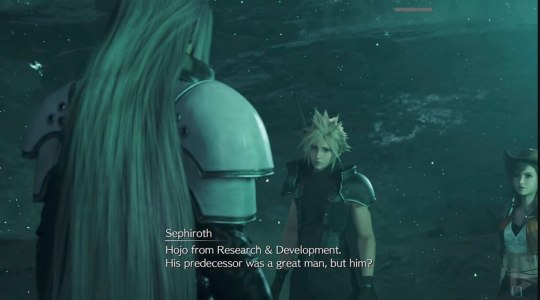
One that Jenova easily took advantage of. After all, as Dirge of Cerberus implies, Hojo ended up implanting himself with alien organic material.
Again, Jenova's power to extract information from an individual when in proximity supports a bleak reading of the events leading up to Nibelheim's ransacking. A person who kept on carrying a photograph of his supposedly late mother and badgered others about his background, as suggested by Ever Crisis episodes, was literally wearing his weakness on a sleeve.
Perhaps the 30-something years of the Jenova Project were supposed to bring Sephiroth there.
Perhaps the chain of events had been nudged in that direction, starting from the very discovery of a derelict non-human lifeform. Nudged by an intelligence both cunning and incomprehensible. And that makes Jenova a much, much scarier presence in the remake than it was ever suggested in OG.
443 notes
·
View notes
Text
A minor detail effectively drops the bomb. The image of the Goddess portrayed by Jessie during Loveless VR play fits closely to the image of Jenova, Calamity from the skies, as revealed in the holographic sequence during the Temple of Ancients quest.

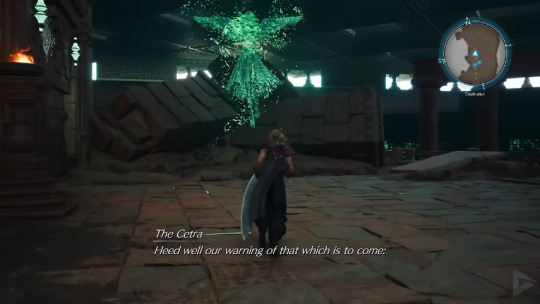

That touch raises a number of troubling questions. The use of imagery that invites comparisons with the Loveless play appears deliberate. This encompasses both the Goddess and the "children of men," as the Cetra refer to humanity. As such, the appearance of children of men is presented identical to the epic figures of Three Friends from the play.


Is Jenova the "Goddess" whose true nature was merely forgotten or misunderstood by those who came after the Cetra, specifically humans?
The Cetra "narrator" makes an intriguing statement, raising the suspicion that something else is going on. It emphasizes the conflicts between humanity and the Cetra, questioning their nature and finally implying that the animosity between the two races may have been sown by their celestial adversary, Jenova.

In a later portion of the Temple quest, the Cetra refer to their nemesis as "a deceiver," who assumed the identities of others and incited strife and chaos among the Cetra. The statement once again underscores the creature's ability not only to shapeshift and cast illusions, but to sift through minds/memories and extract information it can use against their target.
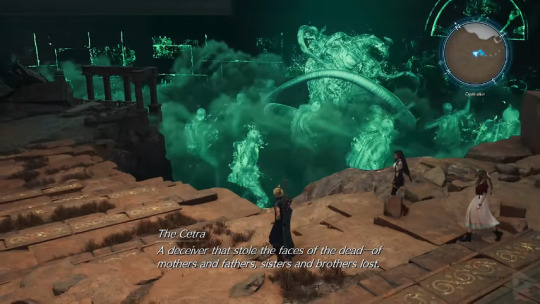
Eventually Cetra people overcame their enemy. At this point of narration, the vision of a tentacle-wielding Lovecraftian horror changes into the aforementioned image of a Goddess. The "narrator" stresses that the enemy was unable to reunite with the Planet and thus fell into a slumber, debunking previously-held fan ideas that Jenova was brain-dead. Or unintelligent, for that matter.

To connecting the dots. It's not a stretch to say that the so-called Goddess was, potentially, Jenova's means of manipulating children of men (thus the Three Friends imagery) in order to promote division and strife among humans, or between mankind and the Cetra. What sticks out to me is the timing of the transformation: the holographic image of Goddess appears at a point of narration when Jenova is on the verge of defeat or defeated, when the entity is allegedly imprisoned in rock strata and goes into hibernation. Almost as if the “Goddess” is its last ditch resort at manipulating those it could yet deceive, i.e. non-Cetra. This brings up the final and most disturbing question.
Just what was the Gift of the Goddess?
Was it but a literary element to the play, a fiction through and through, or was it…a bait? A carefully placed promise of a legendary boon to entice someone susceptible to temptation to come and find the “Goddess” and her Gift... and maybe break Jenova free from wherever the Cetra sealed it, as Ultimania suggests entity's ability to exert influence over those who come into contact with it.
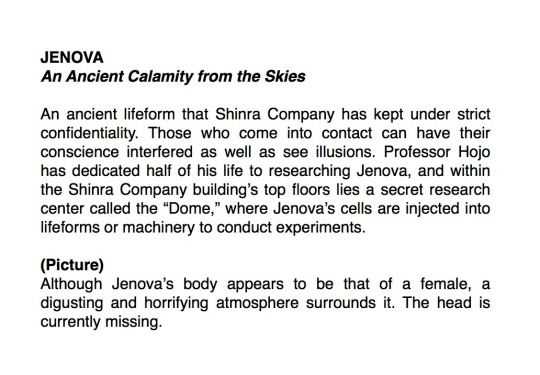
And then there's this:
My friend, your desire
Is the bringer of life, the gift of the goddess
Legend shall speak
Of sacrifice at world's end
(Loveless, Act IV)
A “bringer of life” — just who or, perhaps, what is being brought to life? One could consider it an embellishment inherent to a poem. One could theorize it to be the fabled gift itself. Or one could say that whoever comes to the "Goddess" in search of a boon quite literary “brings it back to life” by awakening.
On a closing note, perhaps it adds a new spin to the old story. Was Genesis' fixation with finding the Gift of the Goddess solely motivated by desperation, or was there more to it?
#ffvii#ff7 rebirth#ff7 remake#ff7#final fantasy 7#final fantasy vii rebirth#jenova#ffvii rebirth#ffvii@luv fandoms
62 notes
·
View notes
Text
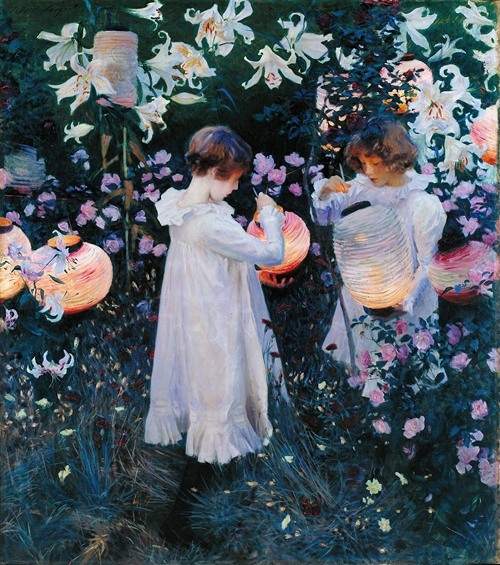
Carnation, Lily, Lily, Rose (c. 1885)
by John Singer Sargent
#classical art#traditional media#traditional art#classical painting#oil painting#paintings#art#painting#oils#john singer sargent#sargent#american painter#pintura#arte#luv вдохновляемся
5 notes
·
View notes
Text

The second episode of the Remake, FF7 Rebirth, has proven to be a terrific experience thus far. SE obviously made a few big decisions here and there.
It is seemingly implied now that Jenova wasn't "brain-dead", and it is hinted that Sephiroth was addled during his breakdown.

It all begins with a strategically placed cut, when Sephiroth touches the door bearing the name Jenova and instructs "Cloud" to close the valve. The scene is merely functional for new fans, yet leaves a vacant space that Crisis Core players will quickly fill in with the inferred arrival of Genesis. Smart move that, leaving the interpretation to the player. Whether Genesis exists inside the Remake's continuity or not, the moment reads differently to each fan. Quite frankly, I was half-expecting “Cloud” to come across a banora apple, rolling on the floor, but I suppose that would be telling.

What's remarkable is that they give Sephiroth almost identical symptoms to those that Cloud has in the remake. Glitches and odd headaches superimpose themselves nicely over the original Crisis Core scene. And, as much as I loathe Tyler Hoechlin's acting in the game, he lends a tangible sense of rage to Sephiroth's disparaging remarks about Hojo and his experiments. You can hear the hatred, a touch of pity, and disgust directed at Hojo's work and the creatures he tortured. In Crisis Core, he refers to the test subjects as “abominations” with the same touch of bitterness.

Back to the point: glitches, pupil dilations, and headaches are visual cues for Jenovaroth's influence or proximity, as shown in the first part of the Remake. However, at this point, Sephiroth is still sane — cracking, but still himself — so the only agent who can exert influence on him is, well, Jenova.
Now, a widely established fan hypothesis maintained that Jenova was brain-dead or comatose. Bodily functions sustained, but brain activity plateaued. Rebirth, however, strangely suggests otherwise.

When "Cloud" returns to Sephiroth in the manor's basement for the second time, Sephiroth recites an excerpt from a journal purportedly written by Professor Gast:
“The specimen, found in a strata dating back two thousand years, smiled with what could only be described as 'ethereal grace'… Though the truth eluded me at first, I later determined that she was an Ancient - or a 'steward of the planet', as they are referred to in legend”.

Remembering the battles with Jenova Dreamweaver and Jenova Emergent, the creature is far from "graceful" or "ethereal". There is nothing graceful about her figure in the tube either, and she is not smiling. The game goes out of its way to lampshade the glaring contradiction by showing the flashes of Jenova’s fanged skull and grotesque body as Sephiroth quotes the passage. So how could Gast perceive her as such?.. The answer is most likely found in Jenova Dreamweaver's description given in Ultimania: the entity has the ability to induce hallucinations in individuals who come into proximity with it, which is further corroborated by Jenova Emergent description.
An ancient lifeform that Shinra Company has kept under strict
confidentiality. Those who come into contact can have their
conscience interfered as well as see illusions. Professor Hojo
has dedicated half of his life to researching Jenova, and within
the Shinra Company building's top floors lies a secret research
center called the "Dome," where Jenova's cells are injected into
lifeforms or machinery to conduct experiments. (Ultimania)

Gast even writes that “the truth eluded him at first”, but LATER he determines the specimen belonged to the race of Ancients, as if that answer was suggested. The implication is chilling: Jenova may have purposefully misled Gast in order to present itself as an Ancient. As Sephiroth later explains in the FF7Rb, Jenova is capable of seeing deep into one's soul and impersonating individuals you fear, love, or hate.

If ShinRA and Gast were determined to unravel the mysteries of Ancients and their Promised Land, it would make sense for Jenova to "scan" Gast and determine the best course of action: disguise itself as an Ancient in order to escape captivity in geological strata jail.
The scene in which Sephiroth reads Gast's notes is possibly the final time he is more or less himself, before Jenova's image intermingles with his for a brief moment. Again, I appreciate Tyler's voice acting in this particular section and the real rage he brought to it. Admittedly, I was concerned that with next-gen visuals, they would take a more gruesome approach, displaying Sephiroth conducting the Nibelheim carnage with sadistic pleasure, but they took a different route. Slow, zombie-like movements, and a glassy expression.

He speared the militiamen as casually as if he were spearing bugs, which is far more frightening from a narrative point. What jumped out was how they emphasized the possessed-like behavior: from snarling and flailing the book like a suffering person to an empty countenance and automaton-like strides, as if he was being beckoned. Which is what "Mother is waiting" implies.
The final segment of the Nibelheim flashback is likely the most essential as well. According to previous developer claims, Sephiroth's will took precedence over Jenova's, and he was in control — whether Jenova was brain-dead or simply of lesser willpower. However, the Rebirth appears to suggest something different right off the bat. First, "Cloud" shouts, "I believed in you… No… Not you — whoever the hell you are!", highlighting the significant personality change and the resulting lack of recognition. But then "Cloud" sees Jenova's image superimposed over that of Sephiroth in a rapid, glitch-like succession.

In other words, he sees Jenova inhabiting Sephiroth's body as a vehicle to once again escape the confinements. Whatever that means, whether it suggests that Jenova is in control from the start, or whether Sephiroth is literally the greatest functional agglomeration of her cells, and therefore literally “becomes” Jenova.
If Jenova's original body was severely damaged — either as a result of eons of incarceration or Hojo's tinkering — it stands to reason that, if she wished to carry out her plan, she would need a new body, one capable of moving at the very least. Perhaps Sephiroth, an able-bodied skilled Mako-infused fighter of considerable might, served as a better "vessel" than her original damaged one.
But the crux of the matter lies elsewhere. The possibility of Jenova being conscious and influencing Gast is very terrifying. With the potential to affect others in close vicinity, she may have influenced the minds of the whole science team behind the Jenova Project, particularly those who had long-term contact with her tissue — Gast and Hojo. It could turn out that the whole idea to revive an “Ancient” was planted by Jenova in order to grow itself a powerful host. In fact, if it could "peer into one's soul," i.e. read minds and memories, it might have easily identified a pressure point to indoctrinate people who could forward her objective. It's one thing to inject tissue samples into an adult body; it's quite another to devise a plan to inject cells into a developing human fetus. Who knows. Perhaps Hojo is such an obsessed Jenova nutcase in large part because he fell under its spell; feelings of inadequacy and being overshadowed by his colleague may have offered a crack in his defenses.

One that Jenova easily took advantage of. After all, as Dirge of Cerberus implies, Hojo ended up implanting himself with alien organic material.
Again, Jenova's power to extract information from an individual when in proximity supports a bleak reading of the events leading up to Nibelheim's ransacking. A person who kept on carrying a photograph of his supposedly late mother and badgered others about his background, as suggested by Ever Crisis episodes, was literally wearing his weakness on a sleeve.
Perhaps the 30-something years of the Jenova Project were supposed to bring Sephiroth there.
Perhaps the chain of events had been nudged in that direction, starting from the very discovery of a derelict non-human lifeform. Nudged by an intelligence both cunning and incomprehensible. And that makes Jenova a much, much scarier presence in the remake than it was ever suggested in OG.
443 notes
·
View notes
Text
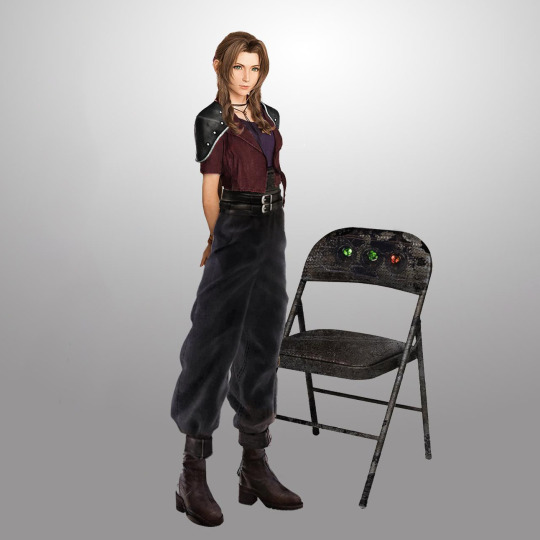
День мертвого
Название: День мертвого (Читать на AO3 | на КФ)
Описание: Один день из жизни другой Аэрис. (Иногда неопределённость пугает не меньше, чем несвобода).
Направленность: Gen, AU, Role Reversal AU, Драббл, Зарисовка одного дня
Персонажи: Аэрис, мельком!Сефирот и др.
Кол-во слов: ~10K
Примечание: АУ на основе забракованного официального варианта сценария, где Аэрис и Сефирот — брат и сестра, плюс вариация на тему roleswap!АУ, а также фрагменты других отбракованных официальных вариантов сценария. Текст написан в формате рассказа одного дня с акцентом на интерпретацию отдельных элементов и игровых сцен в рамках альтернативной вселенной. Внутри разбросаны фрагменты-намёки из других частей компиляции, gotta catch them all.
На протяжении двух с половиной лет (?) черновик проехал со мной не один километр и застал меня в разных расположениях духа; иногда забрасывался полностью, иногда переписывался под влиянием новых выпущенных материалов вроде Ever Crisis. Если кажется, что настроение текста скачет из параграфа в параграф, то так и есть.
В качестве приятного бонуса: арт от psgirl_AD, который подал идею и послужил отправной точкой.
3 notes
·
View notes
Text
Personally, I like the concept, although I do realize something like this will certainly piss a portion of fans off.
What puzzles me about the idea of Sephiroth still carrying out the deed like in OG is that Aerith foiled Jenovaroth's plan EXACTLY because she ended up in the Lifestream. Minimizing damage in OG and eventually curing Geostigma in AC continuity. So, technically, sending her to the Lifestream would be a bad decision that would lead to his (continuous) defeat.
Maybe the whole point of creating an alternate timeline — if Jenovaroth purposefully manipulated the party / did some timefuckery — is to take Aerith off the chessboard. If killing her isn't an option, "ejecting" her to another timeline will keep her from assisting the party and the Planet.
Then again, at a glance it's too much of a cumbersome shenanigan.

Fascinating. Are the Whispers returning? Image courtesy of u/Brokefest. If this isn't an optical illusion caused by depth of field, it sure appears to be. This raises more questions than it answers.
For the longest time, it was assumed that the Whispers were under Harbinger's control. The defeat of the latter implied the annihilation of Whispers. Yet the latest Rebirth trailer shows otherwise, which opens up a plenty of possibilities.
One, something other than Harbinger controls/controlled Whispers. An easy possibility would be the Planet itself — if Harbinger was indeed but a Weapon. On the other hand, during the battle at the Crossroads Sephiroth — symbolically or not — absorbs Meteor illusion and the Whispers/energy that formed it.

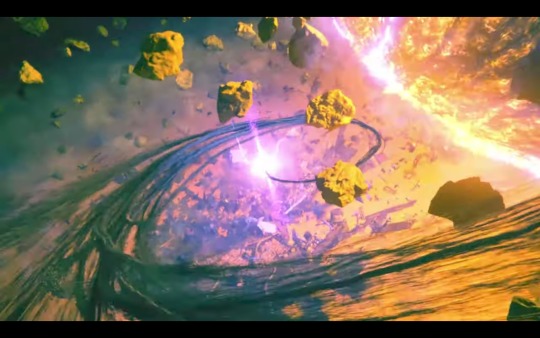

One could guess that with that he gained a control over portion of them to bend to his will. Another idea revolves around the concept of Harbinger being an avatar of Planet’s will. It being destroyed, there’s one other avatar left, that was featured in Crisis Core. The avatar being Minerva, of course, the Goddess, an entity that has a connection with Genesis. Upon the end of CC Genesis ostensibly adopts the mission of serving as Protector of The Planet.
A far more plausible theory is that the last shot of Aerith in the trailer is a flashback/memory of a crucial event, similar to the ending of Remake's Zack's Last Stand. We saw a similar picture there: as Zack was about to take his final fight, a swarm of Whispers circled the area, presumably trying to keep things on track.

We also know something else: ostensibly due to the destruction of Harbinger the Whispers failed to do so, Zack survived, the course of events went off rails. Now the event in Forgotten Capital IS CRUCIAL. It's not an exaggeration to say it's the script's single most game-changing event. Then, if we extrapolate some of the clues from Zack's Last Stand, it wouldn't be a stretch to conclude that this is yet another branching point. The Whispers would try to keep the fate on track, but the party is duped and the fate is derailed. In other words, the expected outcome does not occur. If this is true, it raises even more questions. If Zack's survival resulted in a forking timeline, could Aerith's staying safe result in yet another one?
14 notes
·
View notes
Text

The Deluge, Paul Merwart, c. 1900
#classical art#academicism#academic art#painting#oil painting#classical painting#mythology#biblical mythology#the flood#the deluge#paul merwart#polish painter#french painters#искусство#живопись#luv вдохновляемся
852 notes
·
View notes
Text

Fascinating. Are the Whispers returning? Image courtesy of u/Brokefest. If this isn't an optical illusion caused by depth of field, it sure appears to be. This raises more questions than it answers.
For the longest time, it was assumed that the Whispers were under Harbinger's control. The defeat of the latter implied the annihilation of Whispers. Yet the latest Rebirth trailer shows otherwise, which opens up a plenty of possibilities.
One, something other than Harbinger controls/controlled Whispers. An easy possibility would be the Planet itself — if Harbinger was indeed but a Weapon. On the other hand, during the battle at the Crossroads Sephiroth — symbolically or not — absorbs Meteor illusion and the Whispers/energy that formed it.



One could guess that with that he gained a control over portion of them to bend to his will. Another idea revolves around the concept of Harbinger being an avatar of Planet’s will. It being destroyed, there’s one other avatar left, that was featured in Crisis Core. The avatar being Minerva, of course, the Goddess, an entity that has a connection with Genesis. Upon the end of CC Genesis ostensibly adopts the mission of serving as Protector of The Planet.
A far more plausible theory is that the last shot of Aerith in the trailer is a flashback/memory of a crucial event, similar to the ending of Remake's Zack's Last Stand. We saw a similar picture there: as Zack was about to take his final fight, a swarm of Whispers circled the area, presumably trying to keep things on track.

We also know something else: ostensibly due to the destruction of Harbinger the Whispers failed to do so, Zack survived, the course of events went off rails. Now the event in Forgotten Capital IS CRUCIAL. It's not an exaggeration to say it's the script's single most game-changing event. Then, if we extrapolate some of the clues from Zack's Last Stand, it wouldn't be a stretch to conclude that this is yet another branching point. The Whispers would try to keep the fate on track, but the party is duped and the fate is derailed. In other words, the expected outcome does not occur. If this is true, it raises even more questions. If Zack's survival resulted in a forking timeline, could Aerith's staying safe result in yet another one?
14 notes
·
View notes
Text
youtube
Ммм, чувствую запах шкварок.
То есть подгоревших пятых точек.
Как же доставляет.
3 notes
·
View notes
Text
youtube
Трудно вообразить, что говорю такое о работе маэстро, но в моей книге Hollow > No Promises To Keep. У Hollow (#FFVII Remake) есть индивидуальность, которая обуславливается оригинальным выбором инструментов и вокальными данными исполнителя, да и композиция заряжена динамикой куда сильнее. А No Promises To Keep очень...generic, за неимением более емкого выражения. Ни композиция, ни вокальная партия ничем не запоминаются. Стандартная песня, как из старого голливудского фильма. Как часть игровой пьесы/мюзикла она адекватно решает задачу и соответствует стереотипу, но как титульная песня уступает той же теме Аэрис. Да и голос исполнительницы, пожалуй, слишком глубокий и зрелый для персонажа.
Может показаться, что слова песни намекают на концовку, но, сугубо на мой взгляд, это слишком "в лоб". Куда легче представить под эту музыку клифхенгер. По иронии, No Promises To Keep — вполне себе о разработчиках.
1 note
·
View note